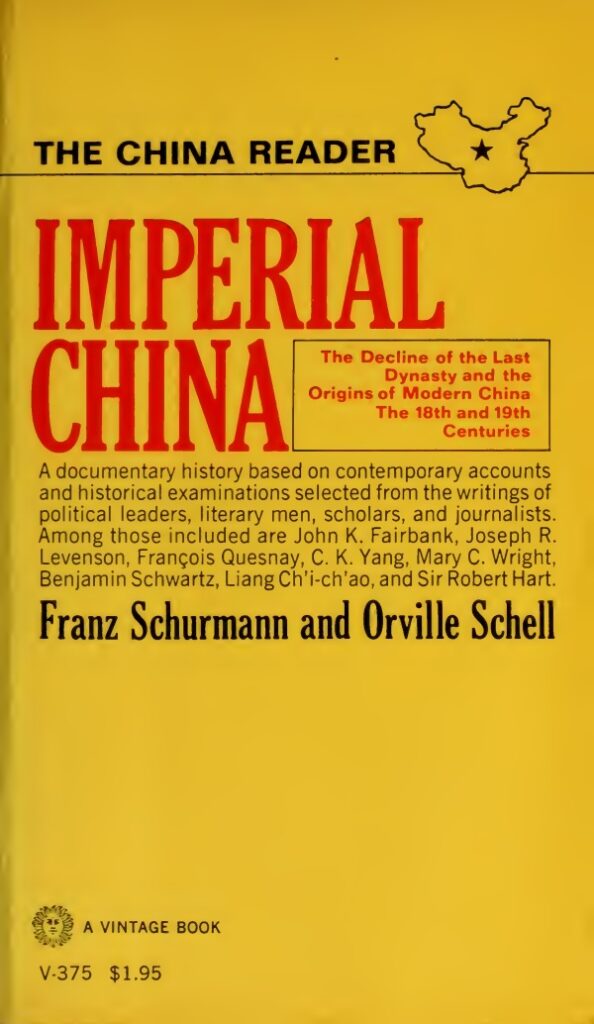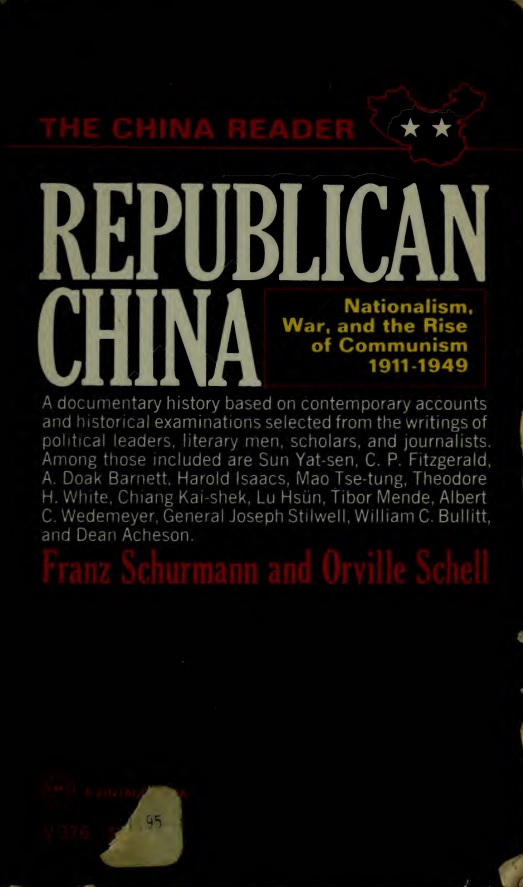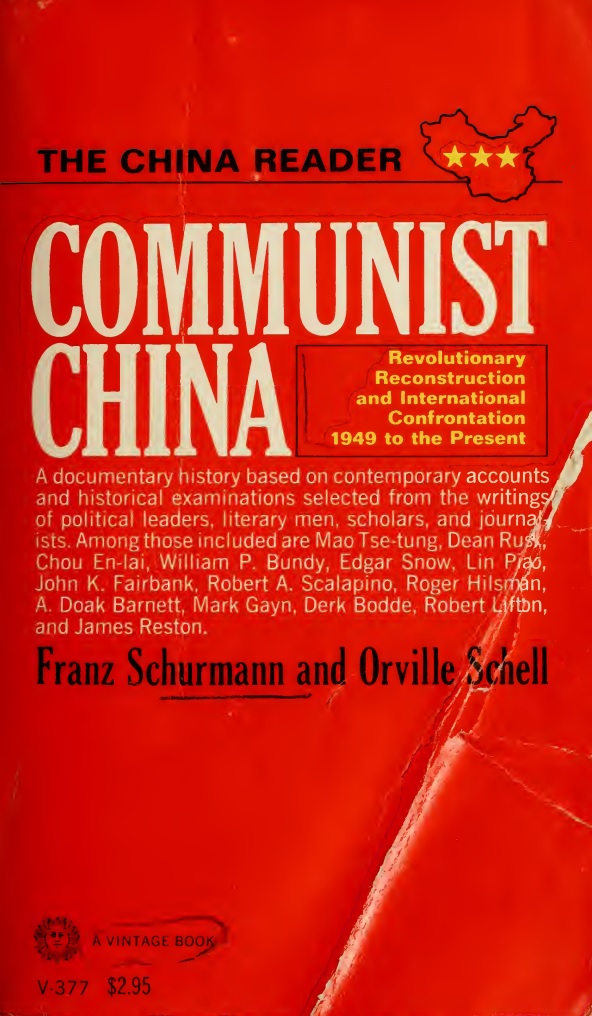Biblioteca / 1960-1969
Franz Schurmann – Orville Schell, editors. The China Reader.
Nueva York: Vintage Books, 1967.
I: Imperial China: The Decline of the Last Dynasty and the Origins of Modern China, the 18th and 19th Centuries. xv, 322 páginas.
II: Republican China: Nationalism, War, and the Rise of Communism, 1911-1949. xvi, 394 páginas.
III: Communist China: Revolutionary Reconstruction and International Confrontation, 1949 to the Present. xix, 667 páginas.



CONTENTS
VOLUME I
Imperial China: The Decline of the Last Dynasty and the Origins of Modern China
The 18th and 19th Centuries
Preface
Introduction
PART I
EMPIRE AND SPLENDOR: THE EIGHTEENTH CENTURY
1 – China—State and Society
The Humanist Ethos of Traditional China
MENCIUS: From The Book of Mencius
Government, Society, and Man in Imperial China: A European Traveler’s Description
ABBÉ HUC: From The Chinese Empire
Chinese Society: The Confucian Pattern and the Political Tradition
JOHN K. FAIRBANK: The Nature of Chinese Society
Wealth, Power, and the Seeds of Decline in the Economy of Imperial China
PING-TI HO: From The Population of China
The Amateur Ideal in Chinese Culture
JOSEPH R. LEVENSON: The Amateur Ideal in Ming and Early Ch’ing Society
The Scholar-Official: The Road to Success 8
WU CHING-TZU: From The Scholars
2 – China and the World
The Emperor’s Decree to the Outer Barbarians
THE CH’IEN LUNG EMPEROR: A Decree
China as Viewed by an Eighteenth-Century Physiocrat
FRANCOIS QUESNAY: From Despotism in China
The Distant and Strange Continent of Europe
WANG HSI-CH’I: Europe to a Chinese Observer
PART II
DECLINE AND HUMILIATION: THE NINETEENTH CENTURY
1 – The West Moves into China
Opium, Free Trade, and the Expansion of British Power
TSIANG TING-FU: The English and the Opium Trade
The Detestable, Strong, but Beatable Foreign Barbarians
A CENSOR: Memorial to the Emperor
A Nineteenth-Century Western China-Expert
THOMAS MEADOWS: From Desultory Notes on the Government and People of China
War: An Instrument of Western Truth and lustice
LT. COL. G. J. WOLSELEY: From War With China
The Legal Foundations of Western Superiority in China
JOHN K. FAIRNANK: The Western Impact
2 – Internal Rebellion
Rebellion: A Recurrent Tradition
C.K. YANG: Religion and Political Rebellion
China’s First Inland Revolution
WOLFGANG FRANKE: The Taiping Rebellion
An Imperial Despot and a Rebellious People in League Against the Foreigners and Their Chinese Sympathizers
SIR ROBERT HART: The Boxers: 1900
3 – Peace and Attempts at Reform
Confucian Adaptability and the Western Challenge
MARY C. WRIGHT: The Modernization of China’s System of Foreign Relations
A Great Statesman Advocates Self-Strengthening
LI HUNG-CHANG: Problems of Industrialization
A Practical Scholar-Official on New Methods of Reform
CHANG CHIH-TUNG: From Exhortation to Study
PART III
COLLAPSE AND DESPAIR: THE LATE NINETEENTH AND EARLY TWENTIETH CENTURIES
Japan’s Modern Sword Cuts into China’s Body
THE JAPANESE EMPEROR: Declaration of War Against China
THE CHINESE EMPEROR: Declaration of War Against Japan
SIR ROBERT HART: The Tragedy of China’s Defeat
Suffering and Starvation Among the Chinese People
WALTER H. MALLORY: From China, Land of Famine
The Western Missionary: Sympathy, Contempt, and Preaching
ARTHUR H. SMITH: From Chinese Characteristics
A Chinese Scholar at the Crossroads Seeks to Uncover the Secrets of the West
BENJAMIN SCHWARTZ: From In Search of Wealth and Power
A Modern Intellectual Becomes Conscious of China’s Degradation
LIANG CH’I-CH’AO: A Polemic for Republican Government
From A Review of China’s Progress
Chronology: 1644-1911
Bibliography
_______
VOLUME II
Republican China
Nationalism, War, and the Rise of Communism, 1911-1949
Preface
Introduction
PART I
REVOLUTION AND REGENERATION: CHINA’S REVIVAL IN THE EARLY DECADES OF THE TWENTIETH CENTURY
1 – The Overthrow of the Dynasty and the Stillbirth of the Republic
A Westernized Doctor, Sun Yat-sen, Becomes China’s First Professional Revolutionary
SUN YAT-SEN: The Revolution Is the Path to the Regeneration of China
The Generals Grab Power
C.P. FITZGERALD: The Early Republic: «Min Kuo» Period
Provincial Warlords: Progeny of the Republican Revolution
DOAK BARNETT: Old-Style Warlordism
2 – Intellectuals Transform the Mind of China
The Cultural Revolution
HU SHIH: The Chinese Renaissance
CHOW TSE-TSUNG: From The May Fourth Movement
3 – The Intellectuals and the People: Ideology and Discontent Unite To Make the Chinese Revolution
The Chinese Communist Party: The Impact of the May Fourth Movement and the Russian Revolution
HAROLD ISAACS: The New Awakening
The Shanghai Coup of April 12, 1927
Urban Revolution Begins: The Communists Organize the Workers of China
HO KAN-CHIH: Rise of the Chinese Working-Class Movement. The Working-Class Movement in Hunan. The Big Political Strike of the Peking-Hankow Railway Workers
Rural Revolution Breaks Out Again: The Communists Organize the Peasants of Inland China
MAO TSE-TUNG: From The Peasant Movement in Hunan
4 – A Political Kuomintang Takes Power; A Military Kuomintang Loses It
The Success and Failure of a Revolution Without Regeneration
THEODORE H. WHITE AND ANNALEE JACOBY: The Rise of the Kuomintang
Moral Precepts of a General and His Wife
MAYLING SOONG CHIANG: Foreword From New Life for Kiangsi
CHIANG KAI-SHEK: My Religious Faith
5 – Anger, Irony, and Discouragement in China’s Greatest Modem Writer
LU HSÜN: From Selected Works
PART II
WAR: REVOLT AND INVASION: THE 1930s AND 1940s
1 – The Japanese Begin to March
The Grand Plan for Conquest
PREMIER TANAKA: The Tanaka Memorial
The First Attacks in a Long War
K.N. LEI: Japanese Occupy Shanghai; Woosung Forts Shelled
Local Chinese Troops Show Great Bravery
In the Wake of Japanese Conquest
2 – The Revolution Goes Inland The Kiangsi Soviet: A Communist and a Nationalist View
MAO TSE-TUNG: The Struggle in the Chingkang Mountains
C.W.H. YOUNG: Life Under the Chinese Soviet Regime
3 – Struggle for Survival: Rebuilding the Communist Movement
TIBOR MENDE: The Long March to Yenan
EDGAR SNOW: Soviet Society
4 – The Kuomintang Confronts Japan
Generalissimo Chiang Kai-shek and Wartime China
THEODORE H. WHITE AND ANNALEE JACOBY: Chiang Kai-shek War
The United States: A Critical Ally
JOSEPH STILWELL: From The Stilwell Papers
5 – Civil Wan The Triumph of Communism
The Strategy and Ideology of Communist Victory
ROBERT B. RIGG: Foundation of Victory
LIONEL MAX CHASSIN: The Roots of Mao’s Victory
Revolutionary Land Reform: A Key Weapon in the Struggle
JACK BELDEN: The Land Problem
Stone Wall Village
The Great Debate: Could China Have Been “Saved”?
ALBERT C. WEDEMEYER: Summary of Remarks… Before Joint Meeting of State Council and All Ministers of the National Government August 22, 1947
WILLIAM C. BULLITT: Report to the American People on China
DEAN ACHESON: Letter of Transmittal Accompanying Report on United States Relations with China
Chronology: 1911-1949
Bibliography
_______
VOLUME III
Communist China
Revolutionary Reconstruction and International Confrontation, 1949 to the Present
Preface
Introduction
PART I
THE PEOPLE’S REPUBLIC OF CHINA^ THE BASIC FRAMEWORK
1 – China’s Domestic Policy: Unity and Development
«Liberation»: the Communists Rapidly Introduce a New System
DERK BODDE: From Peking Diary
Theory and Methods of Chinese Communism
MAO TSE-TUNG: From On Contradiction
Two Different Types of Contradictions
THE CENTRAL COMMITTEE OF THE CHINESE COMMUNIST PARTY: Proposal Concerning the General Line of the International Communist Movement
LIU SHAO-CH’I: From How To Be a Good Communist
Mao Tse-tung
EDGAR SNOW: Power Personality
MARK GAYN: Mao Tse-tung Reassessed
Mao the Poet
MAO TSE-TUNG: From The Poems of Mao Tse-tung
Party and Government: the Organizational Instruments of Rule
FRANZ SCHURMANN: Party and Government
Thought Reform: the Ideological Transformation of the Individual
ROBERT J. LIFTON: Peking’s «Thought Reform»— Group Psychotherapy To Save Your Soul
The Intellectuals: the Dilemma of the Educated
VIDYA PRAKASH DUTT: From China’s Foreign Policy
FRANZ SCHURMANN: A Student from Peking University
HUA LO-KENG: Remolding of Intellectuals
The Peasants: Organization and Reorganization of Rural Society
FRANZ SCHURMANN: Peasants
Economic Development
CHOH-MING Li: Economic Development
The Military System
SAMUEL B. GRIFFITH: The Military Potential of China
2 – China’s Foreign Policy: «Lean to One Side»
Sino-Soviet Relations: Alliance, Friendship, Hostility
DOAK BARNETT: The Sino-Soviet Alliance
HARRY GELMAN: The Sino-Soviet Conflict
Sino-American Relations: the Confrontation of Two Great Powers
RALPH N. CLOUGH: United States China Policy
EDGAR SNOW: Chou En-lai and America
PART II
CHINA TODAY: THE 1960s
1 – Ideology
World Views of China and the United States
LIN PIAO: Mao Tse-tung’s Theory of People’s War
OBSERVER: Whom Is the Soviet Leadership Taking United Action With?
PEOPLE’S DAILY: The War Threat of U.S. Imperialism Must be Taken Seriously
PRAVDA: Interview of Mao Tse-tung with the Japanese Socialists
JAMES RESTON: Washington: the Two Concepts of China
WILLIAM P. BUNDY: The United States and Communist
2 – Domestic Developments
Succession and Generational Change: the Quest for Revolutionary Continuity
MICHEL OKSENBERG: Communist China: A Quiet Crisis in Revolution
Economy and Trade: Recovery and Development
KANG CHAO: The Great Leap
ALEXANDER ECKSTEIN: EcoTwmic Growtk and Foreign Trade
Life in the New Society
EDGAR SNOW: Shanghai
SVEN LINDQVIST: Inside China
CHEN TUNG-LEI: Lei Feng
CHINA YOUTH DAILY: Educated Youths Who Go to Rural and Mountainous Areas
Have a Great Future
Views on Marriage
STANLEY KARNOW: Why They Fled: Refugee Accounts
Science and Technology
C.H.G. OLDHAM: Science in China
3 – Foreign Developments
The Worsening of the Sino-Soviet Dispute
THE CENTRAL COMMITTEE OF THE COMMUNIST PARTY OF THE SOVIET UNION: Moscow Letter
THE CENTRAL COMMITTEE OF THE CHINESE COMMUNIST PARTY: Peking Letter
The State of the Sino-American Confrontation
DEAN RUSK: United States Policy Toward Communist China
OBSERVER: Old Tune, New Plot
CHOU EN-LAI: China’s Policy Toward the United States
The China Hearings
JOHN KING FAIRBANK: Motivate Chinese Behavior According to China’s Needs
GEORGE E. TAYLOR: Why Help Peking…?
One Aspect of the Sino-American Relationship
YUAN SHUI-PO: Soy Sauce and Prawns
China’s Foreign Relations with Other Countries
CH’EN YI: Remarks at a Press Conference
Minorities and Borders
Taiwan
ROBERT A. SCALAPINO: Communist China and Taiwan
JOYCE K. KALLGREN: Vietnam and Politics in Taiwan
Vietnam and the Sino-American Confrontation
DEAN RUSK: Testimony before the Senate Foreign Relations Committee
ROGER HILSMAN: Testimony before the House Foreign Affairs Committee
CHOU EN-LAI: China Is Ready To Take Up U.S. Challenge
ANNA LOUISE STRONG: When and How Will China Go to War?
EPILOGUE
THE «GREAT PROLETARIAN CULTURAL REVOLUTION»
KAO CHu: Open Fire Against the Anti-Party Anti-Socialist Black Line
PEOPLE’S DAILY: Carry Out the Cultural Revolution and Transform the Educational System Completely
LIBERATION ARMY DAILY: Make Our Army a Great School of Mao Tse-tung’s Thought
PEOPLE’S DAILY: Chairman Mao Celebrates the Great Culutral Revolution with Millions of the Masses
PRAVDA: The Hung-wei-ping in Action
Map
Radio Peking’s English-Language Broadcasts to the U.S.
Chronology: 1950-1966
Vote in the UN over Admitting Red China
Bibliography